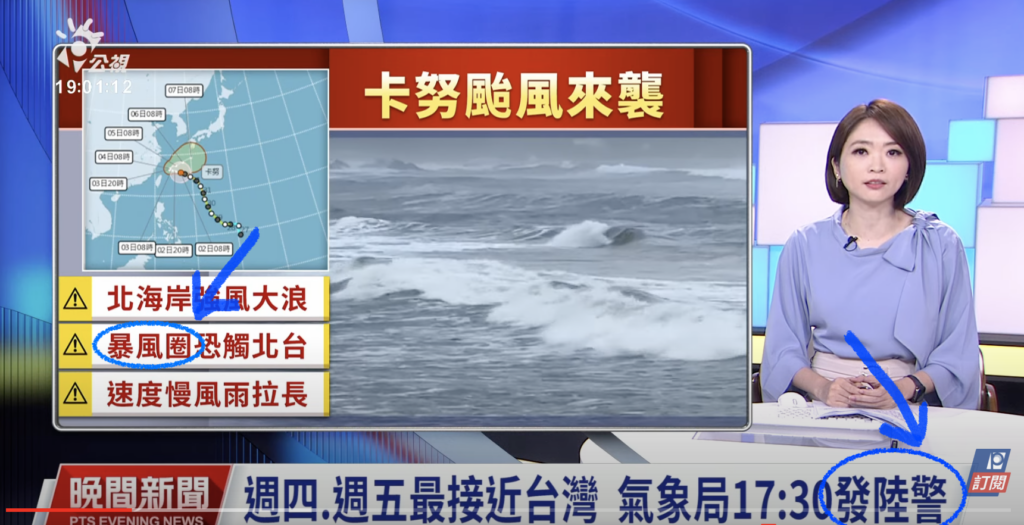颱風/台风 táifēng
Taiwan is prone to being affected by typhoons, especially during the typhoon season, which typically runs from June to October. We experience an average of about 3 to 4 typhoons making landfall each year.
- 輕颱轻台 Mild Typhoon
- 中颱中台 Moderate Typhoon
- 強颱强台 Severe Typhoon
- 超級颱風超级台风 Super Typhoon
- 颱風眼台风眼 eye of the typhoon

天氣預報/天气预报 tiānqì yùbào
天气预报 tiānqì yùbào translates to “weather forecast” in English. It refers to the prediction and reporting of weather conditions for a specific location and time.
- 陸上颱風警報(陸警)陆上台风警报(陆警) land warning
- 海上颱風警報(海警)海上台风警报(海警) sea warning
- 暴風圈暴风圈 strom circle
- 登陸登陆 landfall
天氣預報說明晚會發布陸上颱風警報天气预报说明晚会发布陆上台风警报
The weather forecast indicates that a typhoon warning for the mainland will be issued tomorrow evening.

颱風假/台风假 táifēng jià
In Chinese, “Typhoon Leave” is referred to as 台风假 táifēng jià. Don’t doubt it! In Taiwan, when a typhoon approaches and the wind force and rainfall reach a certain level, the county and city governments will announce the implementation of “Typhoon Day” or “Typhoon Leave.”
台北、新北、基隆、桃園,將在今晚8點宣佈是否放颱風假台北、新北、基隆、桃园,将在今晚8点宣布是否放台风假
Taipei, New Taipei, Keelung, and Taoyuan will announce at 8 PM tonight whether there will be a typhoon holiday. (台北、新北、基隆、桃園 = 北北基桃)
強颱來了!希望明天能有颱風假强台来了!希望明天能有台风假
Severe Typhoon is coming! I hope there will be a typhoon holiday tomorrow.

停班停課/停班停课 tíngbān tíngkè
停班 tíngbān literally translates to “stop work” or “suspend work.” 停课 tíngkè translates to “suspend classes” or “cancel classes.” During a typhoon, when the weather conditions become hazardous and the typhoon is expected to have a significant impact, schools, businesses, and offices may announce a 停班停课 tíngbān tíngkè for the safety of the people.
政府宣布今天停班停課一天政府宣布今天停班停课一天
The government announced that today there will be no work or classes due to the typhoon.
因為颱風的緣故,周二停班停課因为台风的缘故,周二停班停课
Tuesday will be a day off because of the typhoon.

停電/停电 tíngdiàn
停 tíng means “to stop” or “to halt.” 电 diàn refers to “electricity” or “electric power.” Together, 停电 means “power outage” or “electricity outage.”
強颱造成台灣中部停電强台造成台湾中部停电
The strong typhoon caused a power outage in central Taiwan.

淹水 yānshuǐ
淹 yān means “to flood” or “to submerge.” 水 shuǐ translates to “water.” 淹水 refers to “flooding” or “being submerged in water.”
排水不好的地方容易淹水排水不好的地方容易淹水
Places with poor drainage are prone to flooding.

土石流 tǔshíliú
土 tǔ means “soil” or “earth.” 石 shí translates to “rock.” 流 liú refers to “flow” or “stream.” 土石流 is a term that describes a “debris flow” or “mudflow.”
山區須嚴防土石流山区须严防土石流
Mountainous areas must be take strict precautions against mudslides.



